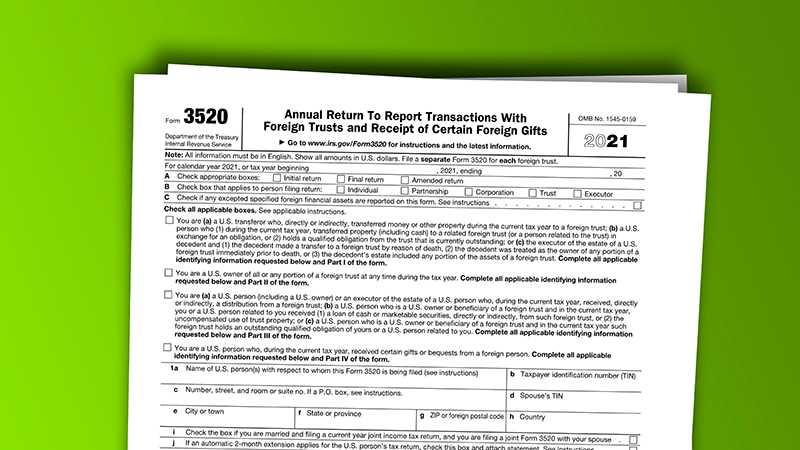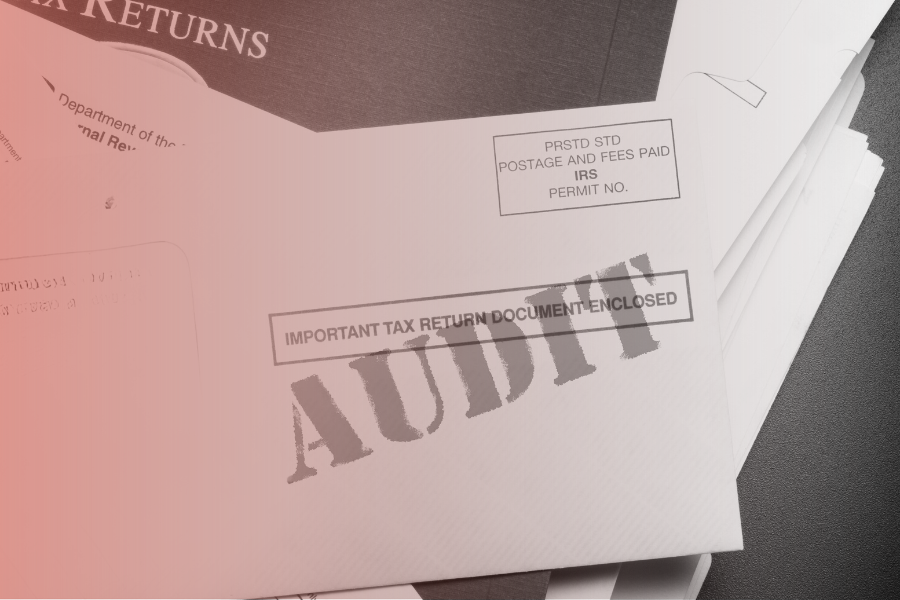Form 3520 foreign gift: taxpayer’s guide
Just How Reporting Foreign Inheritance to IRS Functions: Secret Insights and Standards for Tax Coverage
Maneuvering the intricacies of reporting foreign inheritance to the IRS can be tough. There are certain thresholds and types that people need to understand to assure compliance. For example, inheritances surpassing $100,000 from non-resident aliens require certain attention. Failing to stick to these guidelines might lead to charges. Recognizing the nuances of tax obligation effects and required paperwork is vital. The following areas will certainly outline crucial insights and guidelines for efficient tax reporting.
Understanding Foreign Inheritance and Its Tax Obligation Effects
It is vital for them to understand the involved tax ramifications when individuals get an inheritance from abroad. In the USA, inherited possessions are normally not subject to earnings tax, but the estate where the inheritance comes might have details tax obligation commitments. International inheritances can make complex issues, as different countries have varying regulations concerning inheritance tax. Individuals must know that while they might not owe tax obligations on the inheritance itself, they might be accountable for reporting the value of the foreign asset to the Internal Revenue Solution (INTERNAL REVENUE SERVICE) Furthermore, currency exchange prices and evaluation techniques can impact the reported worth of the inheritance. Recognizing these elements is essential to stay clear of unforeseen tax responsibilities. Looking for assistance from a tax obligation expert skilled in international inheritance regulations can offer clarity and warranty compliance with both united state and foreign tax needs.

Reporting Requirements for Inherited Foreign Properties
The reporting requirements for acquired foreign assets entail particular thresholds and limitations that taxpayers should recognize. Compliance with IRS regulations necessitates the suitable tax obligation kinds and recognition of potential fines for failure to report. Understanding these aspects is vital for people getting foreign inheritances to prevent lawful issues.
Reporting Thresholds and Boundaries
While traversing the complexities of acquired foreign properties, recognizing the reporting thresholds and restrictions set by the IRS is important for conformity. The IRS requireds that united state taxpayers report foreign inheritances surpassing $100,000 from non-resident aliens or international estates. This restriction relates to the overall worth of the inheritance, incorporating all assets received, such as cash, property, and investments. Furthermore, any kind of international financial accounts amounting to over $10,000 have to be reported on the Foreign Savings Account Report (FBAR) Failure to abide by these limits can cause significant penalties. It is imperative for taxpayers to precisely examine the worth of acquired international properties to assure timely and certified reporting to the IRS
Tax Return Summary

Charges for Non-Compliance
Failure to adhere to coverage demands for inherited international possessions can lead to significant fines for united state taxpayers. The IRS imposes strict guidelines relating to the disclosure of foreign inheritances, and failings can result in fines that are often significant. Taxpayers might face a charge of up to $10,000 for failing to submit Form 3520, which reports international presents and inheritances surpassing $100,000. In addition, continued non-compliance can rise penalties, possibly reaching up to 35% of the value of the acquired asset. In addition, failure to record can additionally activate more serious effects, including criminal charges for unyielding forget. Taxpayers need to remain vigilant to stay clear of these repercussions by making sure timely and precise coverage of international inheritances.
Trick Forms and Paperwork Needed
When a specific obtains an international inheritance, it is important to comprehend the vital kinds and documentation required for compliance with IRS policies. The main type needed is the IRS Type 3520, which need to be submitted to report the invoice of the international inheritance. This kind gives thorough information about the inheritance, consisting of the identity of the international decedent and the value of the acquired possessions.
Additionally, if the inherited residential property consists of international bank accounts or various other financial assets, the person might require to submit the Foreign Financial institution Account Record (FBAR), FinCEN Type 114, if the total value exceeds $10,000. Proper documentation, such as the will or estate documents from the foreign territory, must likewise be gathered to confirm the inheritance insurance claim. Maintaining comprehensive records of all interactions and transactions connected to the inheritance is vital for exact reporting and conformity with IRS needs.
Tax obligation Treaties and Their Effect On Estate Tax

Comprehending the ramifications of tax obligation treaties is essential for people obtaining foreign inheritances, as these agreements can significantly influence the tax obligation commitments associated with acquired properties. penalties for not filing Form 3520. Tax treaties between countries usually supply details standards on exactly how inheritances are taxed, which can lead to reduced tax obligation responsibilities or exemptions. For example, a treaty may stipulate that specific kinds of inheritances are exempt to tax in the recipient's country, or it may enable credit histories versus tax obligations paid abroad
Individuals should familiarize themselves with the certain stipulations of relevant treaties, as they can vary significantly. This understanding aids assure conformity with tax obligation regulations while optimizing possible advantages. In addition, recognizing just how treaties connect with residential legislations is necessary to accurately report foreign inheritances to the IRS. Consequently, consulting with a tax obligation specialist fluent in global tax obligation legislation may be recommended to navigate these complex regulations effectively.
Usual Errors to Stay Clear Of When Coverage Inheritance
Although many people believe they can conveniently navigate the intricacies of reporting international inheritances, they typically overlook essential details that can bring about significant mistakes. One common mistake is see this site stopping working to report the inheritance in the correct tax year, which can cause penalties. Furthermore, some people disregard to transform foreign possessions right into united state dollars at the proper exchange price, subsequently misstating their worth. An additional frequent oversight includes misconstruing the reporting thresholds; individuals may presume they do not require to report if the inheritance is listed below a certain amount, which is unreliable. Misclassifying the kind of inheritance-- such as dealing with a present YOURURL.com as an inheritance-- can make complex reporting commitments. People commonly fall short to maintain complete documents, which is necessary for preventing and verifying claims audits. Awareness of these challenges can greatly boost conformity and minimize the risk of financial effects.
Looking For Expert Assistance for Complex Scenarios
Navigating the complexities of reporting foreign inheritances can be intimidating, specifically for those with complicated financial scenarios. People facing issues such as multiple international possessions, varying tax obligation implications throughout jurisdictions, or intricate family members dynamics might take advantage of specialist help. Tax experts concentrating on global tax obligation regulation can offer very useful understandings into the nuances of IRS guidelines, making sure conformity while decreasing potential obligations.
Involving a qualified public accounting professional (CERTIFIED PUBLIC ACCOUNTANT) or tax obligation attorney with experience in international inheritance can help clear up reporting demands, recognize appropriate exceptions, and strategize finest tax obligation approaches. Moreover, they can assist in completing needed kinds, such as Form 3520, and handling any kind of additional disclosure demands.
Ultimately, seeking expert support can alleviate tension and improve understanding, enabling people to concentrate on the psychological facets of inheritance as opposed to becoming overwhelmed by tax complexities. This proactive method can cause a lot more desirable end results in the future.
Regularly Asked Inquiries
Do I Required to Record Foreign Inheritance if I'm Not a united state Resident?
Non-U.S. residents normally do not require to report foreign inheritances to the IRS unless they have particular connections to U.S. tax regulations. It's a good idea to seek advice from a tax professional to clarify specific scenarios.
Are There Penalties for Failing to Record Foreign Inheritance?
Yes, there are charges for failing to report international inheritance. People may face considerable penalties, and the IRS can enforce extra repercussions for non-compliance, potentially influencing future tax obligation filings and monetary status.
Can I Subtract Expenses Associated With Taking Care Of Inherited Foreign Assets?
Expenditures connected to managing acquired foreign properties are typically not insurance deductible for tax purposes. Nevertheless, individuals must speak with a tax obligation expert for advice tailored to their details scenarios and potential exceptions that might apply.
Just How Does Foreign Currency Impact the Worth of My Inheritance Record?
Foreign money variations can significantly affect the reported worth of an inheritance. When transforming to united state dollars, the currency exchange rate at the time of inheritance and reporting figures out the last reported value for tax functions
What Takes place if My International Inheritance Is Held in a Count on?
It might make complex coverage needs if a foreign inheritance is held in a trust. The count on's structure and tax implications should be evaluated, as beneficiaries might deal with differing tax responsibilities based on jurisdiction and trust kind.
The Internal revenue service requireds that United state taxpayers report international inheritances surpassing $100,000 from foreign estates or non-resident aliens. Additionally, any international economic accounts completing over $10,000 need to helpful site be reported on the Foreign Bank Account Record (FBAR) Individuals inheriting international possessions have to usually report these on Type 8938 (Statement of Specified Foreign Financial Assets), if the overall value exceeds certain thresholds. Depending on the nature of the inheritance, various other forms such as Form 3520 (Annual Return To Record Purchases With Foreign Trusts and Receipt of Particular International Presents) might likewise be needed. Furthermore, if the acquired home includes international bank accounts or various other economic properties, the individual may need to file the Foreign Bank Account Report (FBAR), FinCEN Type 114, if the complete worth surpasses $10,000.